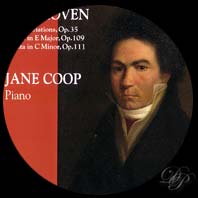| |
|
 |
|
|
| |
| |
|
This information has been published in the booklet of the cd: "Beethoven - Jane Coop, piano (Skylark)". Jane Coop wrote the presentation of the wroks. Many thanks to Skylark for their authorization for publishing these texts on the website. |
 |
|
|
|
Variation form was always presented an apparent contradiction: on the one hand it is a seemingly simple, structured means of adding and transforming, while on the other it is a free and open framework, lending itself to unpredictability and imagination - depending on the creator's vision. The three works on this recording reveal Beethoven's incredible dramatic intuition within the obvious boundaries of this form. At the time he wrote his Opus 35, he was experimenting with both the treatment of the theme (separating the bass and treble into two distinct elements) and the scope of the work (now much larger than ever before). By the time he embarked on the Sonatas Op. 109 and 111, both of which contain - as a major part of the work - variations, he had surpassed all sense of restriction. In each case the variations seem to evolve from an inner manifestation, rather than an outer dictation, and build to a state of personal Utopia. |
|
|
|
In 1802, Beethoven was thirty-two, and had been facing the tragedy of his oncoming deafness for six years. He spent the summer in Heiligenstadt - a beautiful country retreat - but the seclusion simply encouraged him to withdraw and brood, as well as to continue the painful outward pretence that his illness did not exist. It was during this, the lowest point in his life, that he wrote a moving confession of his worst fears and doubts, and it seemed to act as a kind of purge; in October, he sent his publisher a copy of his 'Grand Variations and Fugue for Piano, Op. 35'. The theme in its fully harmonized form (the stark and grotesque bass and the dancelike melody) had already existed in his Prometheus Ballet music; however, the work is known today as the 'Eroïca Variations', due to the fact that in 1804, the same rustic dance was made the theme of the finale of the great Third (`Eroïca') Symphony. The abounding joy and humour which permeates the entire work is all the more surprising in the light of the composer's dark emotional and physical state. |
|
© Jane Coop
|
 |
|
|||||||||||||||||||